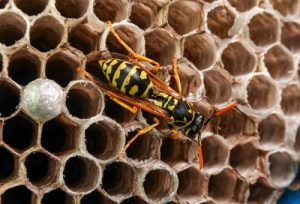Home / Blog / Ants / Do Dryer Sheets Keep Bugs Away? Fact vs. Fiction
Do Dryer Sheets Keep Bugs Away? Fact vs. Fiction

Scientifically reviewed by Rachel Maldonado
-Published on August 23, 2024
-Updated on December 3, 2025
Do Dryer Sheets Keep Bugs Away? Fact vs. Fiction
Ever heard of using dryer sheets to keep bugs at bay? It sounds almost too good to be true. After all, who wouldn’t want a quick, easy, and affordable fix to all those pesky insect problems?
The idea that dryer sheets can repel bugs has been circulating for years. People claim these household items can keep mosquitoes, ants, and even mice away.
But where did this notion come from? And why do so many people swear by it?
The Origin of the Dryer Sheet Pest Control Myth
Dryer sheets are designed to reduce static and add a pleasant fragrance to your clothes. They contain compounds like benzyl acetate and linalool, which contribute to their scent.
Linalool, found in lavender and basil, is known for its insect-repelling properties as is beta-citronellol. Both are found in certain insect repellents.
Because of this, it seemed logical that if these ingredients deter insects in one product, they might work in another.
However, several scientific studies have explored the effectiveness of dryer sheets as insect repellents, and the results are mixed. Some studies suggest that dryer sheets might repel certain insects, but the evidence isn’t overwhelming.
A Closer Look at Ingredients
Again, dryer sheets often contain linalool, which is derived from lavender and other flowers, and beta-citronellol, which comes from citronella. These compounds do have some insect-repelling properties.
However, the concentration in dryer sheets may not be strong enough to be truly effective.
In practical settings, dryer sheets might have some impact, but they aren’t foolproof. You might notice fewer bugs in your immediate area, but it’s not a guaranteed solution.
It’s a bit like using a garden hose to put out a forest fire – it works to an extent, but it’s not the best tool for the job.
How Well Do Dryer Sheets Work for Different Types of Pests?
Let’s break down the dryer sheet debate a bit more:
Fungus Gnats
This is perhaps one area where dryer sheets do live up to the hype: in a study conducted by Kansas State University, researchers discovered that dryer sheets could repel fungus gnats.
They placed dryer sheets in pots containing fungus gnats and found fewer gnats in those pots compared to control pots.
While this provides some evidence that dryer sheets might have repellent properties, it’s limited to one type of insect.
Mosquitoes
Some people claim that rubbing a dryer sheet on their skin or placing one nearby can keep mosquitoes away. However, research on this is scarce. The concentration of linalool in a dryer sheet is minimal compared to natural repellents like citronella or DEET-based products.
If you’re facing a mosquito problem, it’s best to stick with proven solutions like mosquito repellent sprays, citronella candles, or mosquito nets.
Ants
Ants can be a real nuisance when they invade your home, so it makes sense that some homeowners have tried placing dryer sheets near ant trails or entry points to deter them. While the strong scent of dryer sheets might confuse ants and temporarily disrupt their trail, it’s not a long-term solution.
Ants are persistent creatures, and once they find a food source, they’ll keep coming back. To effectively eliminate ants, it’s better to use ant baits, traps, or call a professional pest control service.
Spiders
Some people believe that placing dryer sheets in corners or near windows can repel spiders. Again, while the scent might discourage spiders from settling in those areas, it won’t solve the problem entirely.
Spiders are attracted to homes with abundant food sources, such as other insects. The best way to keep spiders at bay is to reduce clutter, seal entry points, and use spider repellents or traps.
Bees
Bees and wasps can be particularly troublesome during outdoor activities. Some suggest hanging dryer sheets around picnic areas or patios to keep these stinging insects away. While the scent might mask food odors and deter bees and wasps to some extent, it’s not foolproof.
To avoid attracting bees and wasps, it’s essential to keep food covered, clean up spills promptly, and use insect repellent sprays or citronella candles designed for outdoor use.
Fleas
Some claim that placing dryer sheets in pet bedding or rubbing them on their pets can repel fleas. However, there’s little scientific evidence to support this.
Fleas are resilient pests, and using dryer sheets alone won’t provide adequate protection. It’s crucial to use veterinary-approved flea treatments and regularly clean and vacuum your home to prevent flea infestations.
Mice
Mice can be a significant problem, especially in colder months when they seek shelter indoors. It’s often believed that placing dryer sheets in cabinets, drawers, or near entry points can deter mice. While the scent might temporarily discourage them, it’s not a reliable solution.
Mice are resourceful creatures, and once they find a way in, they’ll continue to explore. To keep mice out, you need to seal entry points, use traps, and eliminate food sources.
Save the Dryer Sheets for Laundry Dry
Dryer sheets might offer some minor relief from bugs, but they’re not a silver bullet. The scientific evidence is mixed for most types of pests, and while they might have some minor repellent properties, they aren’t a substitute for more robust solutions.
For homeowners looking to keep their spaces bug-free, it’s best to rely on proven methods and products. And if you’re dealing with a persistent pest problem, professional help might be the way to go.
Ready to tackle your bug problem head-on? Join our family of satisfied customers at Hawx Pest Control. Our experts are here to provide effective, reliable solutions tailored to your needs. Get in touch today to learn more!
Related Articles
Visit our blog to learn more.
→






